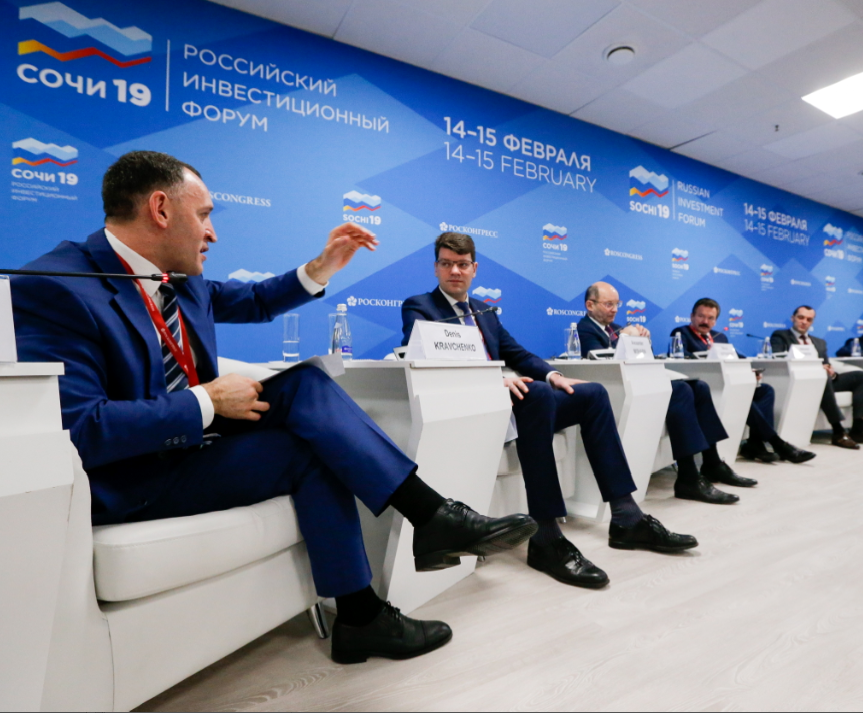 On February 14, the site of the Russian Investment Forum in Sochi became the venue for the business session 'Industrial Clusters. How to Increase the Investment Attractiveness of the Regions.' The session was moderated by Andrei Shpilenko, director of the Association for the Development of Clusters and Technology Parks of Russia. One of the speakers of the event was the chairman of the Board of Directors of Titan Group Mikhail Sutyaginsky (Omsky Biocluster member, Titan-Agro LLC, is included in Titan Group).
On February 14, the site of the Russian Investment Forum in Sochi became the venue for the business session 'Industrial Clusters. How to Increase the Investment Attractiveness of the Regions.' The session was moderated by Andrei Shpilenko, director of the Association for the Development of Clusters and Technology Parks of Russia. One of the speakers of the event was the chairman of the Board of Directors of Titan Group Mikhail Sutyaginsky (Omsky Biocluster member, Titan-Agro LLC, is included in Titan Group).
Representatives of the government and business discussed the peculiarities of using the potential of industrial clusters in the development of industry in the regions of the Russian Federation and increasing the competitiveness of regional enterprises in the Russian and foreign markets.
Andrei Shpilenko noted that industrial clusters in the four years of their existence have already established themselves as an effective model for the development of cooperative ties in the industry of the regions. In Russia, 43 industrial clusters have been formed in various sectors of the manufacturing industry. Creating interconnections between enterprises in the form of clusters makes it possible for Russian enterprises to more actively identify and occupy free investment niches, analyze for weak points at all stages of production - outdated technologies, dependence on imported components, and high production costs. According to the session moderator, the industrial cluster model provides promising business markets and allows regions to more effectively attract investment.
Denis Kravchenko, Deputy Chairman of the State Duma Committee on Economic Policy, Industry, Innovative Development and Entrepreneurship, noted that "we support (within the framework of the Growth Drivers federal party project - ed.), above all, those projects that provide the greatest effect on the development of regional economies and future." The most promising among the various projects that are being implemented in Russia, Denis Kravchenko, noted the cluster model:
"Clusters are a source of high-quality investment offers for business. We saw this on the example of the Interregional Industrial Cluster 'Composites without Borders', the Electrotechnical Industrial Cluster of the Pskov region, the Petrochemical and Agrobiotechnological Clusters of the Omsk region, the National Aerosol Cluster and others. We recommend regional authorities, corporations of regional development, state corporations and companies with state participation to continue the formation of industrial clusters to increase the investment attractiveness of the regions."
Acting head of the Lipetsk region, Igor Artamonov, in response, spoke about Lipetsk experience in creating clusters. In particular, the region’s approach to the creation of industrial ecosystems was presented. When there is an anchor investor and satellite enterprises gather around it, a favorable tax and administrative environment is created, the logistics infrastructure is being developed. At the same time, enterprises are provided with qualified personnel. "We are ready to provide infrastructure and benefits. We want to expand the production chain - for this we need to develop our ideas of industrial ecosystems. Open enterprises that will work with existing ones," Igor Artamonov said.
The cluster model allows to develop not only the domestic industrial market in Russia, but also to build relations with foreign companies and export Russian products more actively.
Based on the Association for the Development of Clusters and Technology Parks of Russia.

